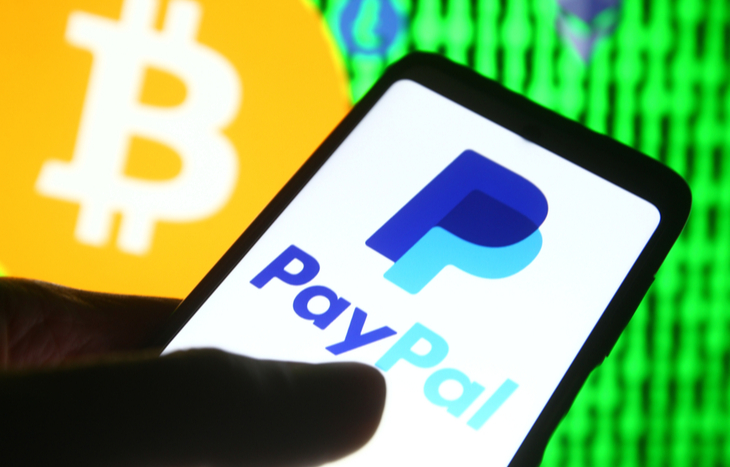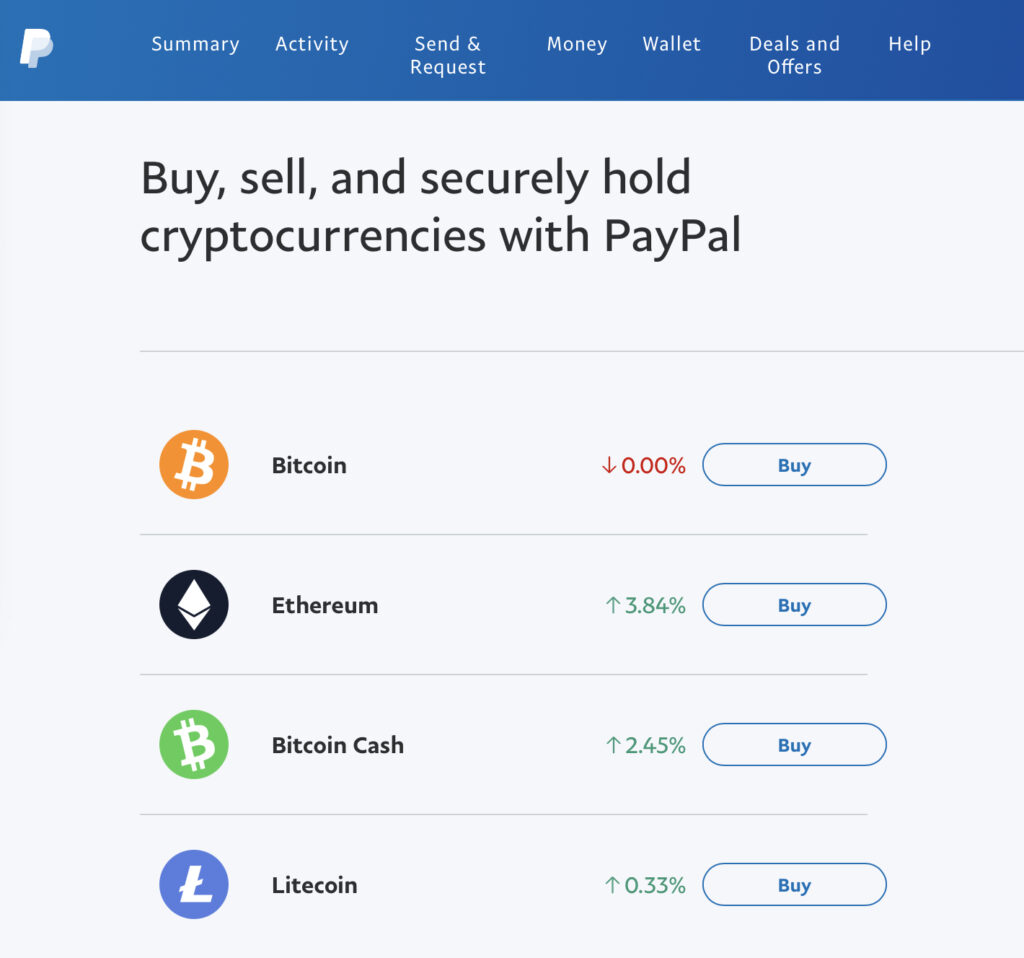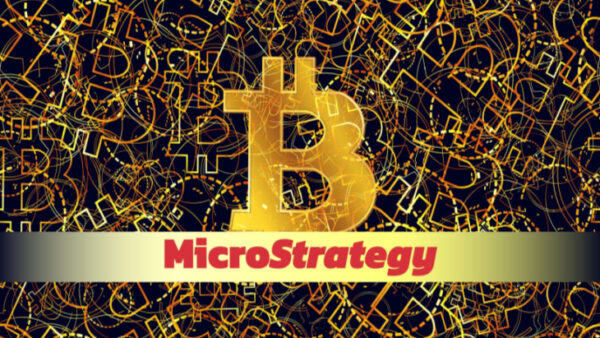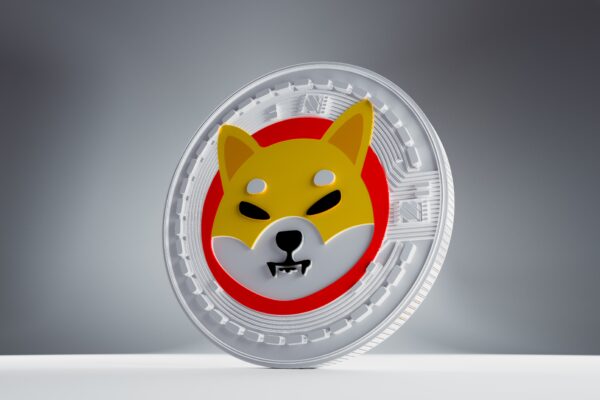PayPal Crypto Checkout Adds a New Level of Functionality
Cryptocurrency is starting to look a lot more like an actual currency. The new PayPal crypto checkout feature allows customers (in the U.S. only, for now) to use their digital dollars to buy goods from anyone who accepts PayPal as a payment option.

This means that folks who have amassed a chunk of crypto change can walk into an Apple store and pick up the latest shiny whatever with Bitcoin. Have you been eyeballing a new grill at Home Depot but didn’t want to go through the trouble of exchanging your Bitcoin for dollars? Well, the new PayPal crypto checkout feature lets you skip that step. That is, if you have crypto in your PayPal wallet.
PayPal isn’t brand-new to the world of cryptocurrencies. The company added the ability to buy and sell certain cryptos using its mobile app or via a desktop computer back in November. And for those new to crypto, it’s about as easy an interface as there is to use. Here’s what it looks like:

As you can see, though, the drawback is that investors have limited options. PayPal users are limited to Bitcoin, Ethereum, Bitcoin Cash and Litecoin. Nonetheless, for those who already have a PayPal account, it’s easy-peasy.
Most crypto exchanges make new users jump though a lot of hoops to set up an account. Even our favorite crypto exchange, Coinbase, requires you to submit a lot of information and a lot of documents to set up an account. On the other hand, to use PayPal as an exchange requires only that you accept the company’s policies. For those who already have a PayPal account, this takes roughly 45 seconds. As someone who’s set up nearly a dozen different crypto accounts, I found PayPal’s process refreshingly simple.
Now, About That PayPal Crypto Checkout…
Anyone familiar with payment processing companies knows that they aren’t facilitating transactions out of the goodness of their hearts. These companies make money when you use their services. And that’s the case with the new PayPal crypto checkout too.
In order to use the PayPal crypto checkout, you’ll need to start by adding some crypto coin to your account. Users will have to pay a transaction fee to use PayPal to buy crypto. For instance, anyone picking up less than $25 worth of crypto is subject to a $0.50 fee. Those who buy between $25 and $100 worth are charged a fee of 2.3%. From $100.01 to $200 results in a 2% fee. Anywhere from $200.01 to $1,000 leads to a 1.8% fee going to PayPal. And for crypto purchases above $1,000.01, PayPal takes a 1.5% cut.
But that’s not the only way PayPal makes its money. The company also makes money when folks buy, sell and spend their cryptocurrency. The latter two come from the company using what it refers to as a crypto “spread.”
When a user sells or spends their crypto, PayPal charges a spread between the market price it receives from its trading service provider and the exchange rate between crypto and the U.S. dollar. For more details, you can read PayPal ‘s statement here.
The fees aren’t completely out of line with other crypto exchanges, but they are nominally higher. That’s the price one pays for convenience, I guess.
The Biggest Drawbacks…
As a payment processor, PayPal is pretty secure. But with all due respect to the company, though, I wouldn’t necessarily want to keep thousands of dollars of assets in my PayPal account. At least with my bank account, there are laws and industry practices that provide coverage from cyber theft. With PayPal… not so much.
If a hacker were to crack someone’s login info, they’d quickly be able to make off with any stash of crypto they got their hands on. And the very nature of cryptocurrency would make it all but impossible to ever track down.
But this problem isn’t distinct to PayPal. Any exchange is somewhat susceptible to hacking. That’s why “cold storage” crypto wallets are the preferred method of storing crypto. Keeping your crypto in an exchange is like walking around with money in your wallet. Yeah, it’s pretty safe in there. But cold storage wallets take crypto offline. That’s like keeping your money in a safe at home.
That leads us to the biggest drawback of the PayPal crypto checkout functionality. Simple isn’t always better. Once someone buys crypto with their PayPal account, that’s where the crypto stays. The Bitcoin, Ethereum, Bitcoin Cash or Litecoin you pick up using PayPal is locked in your PayPal account until you trade it.
Additionally – at least for the time being – you can’t seamlessly transfer crypto you already have into your PayPal account. And PayPal doesn’t yet offer protection like private keys that would allow a user to access their crypto if they ran into any problems with their PayPal account.
The lack of super-security means that anyone with crypto in their PayPal account should be sure to – at the very least – enable two-factor authentication. And by all means, it’s imperative that account holders stay in PayPal’s good graces. The service is too new to know what would happen to the cryptocurrency in an account of someone who broke one of the company’s policies.
The Bottom Line on the New PayPal Crypto Checkout
This is big news. It’s never been easier to trade your crypto for goods or services. The fees aren’t the best, but PayPal’s checkout screen will show you about how much you’re spending in fiat currency. So at the very least, users will know whether or not they’re comfortable with spending their Bitcoin plus the fees on that pair of Birkenstocks.
But the silo PayPal has created – essentially separating itself from any other exchange or storage device – is a big drawback for now. For the time being, anyone with Bitcoin in another account who wanted to use it to make a payment from their PayPal account would first have to cash it out. Then they’d have to transfer the funds to their PayPal account and use them to buy some cryptocurrency. But at that point, they would have been able to pay with fiat dollars just as easily – without incurring PayPal’s crypto fees.
It’s not perfect yet. And it may or may not get better. But one thing’s certain: Crypto has entered the mainstream. On top of the new PayPal crypto checkout service, Mastercard has hinted at entering the crypto space. Apple may too. And to find more details, click on those links.
If you’re still wrapping your head around cryptocurrency and how to make it work for you, look no further than the free Manward Financial Digest e-letter. It’s packed with valuable investment insight and tutorials on how to navigate the crypto space. You can sign up by simply entering your email address in the box below. It’s the best zero dollars you’ll ever spend to learn about cryptocurrency.
About Matthew Makowski
Matthew Makowski is a senior research analyst and writer at Investment U. He has been studying and writing about the markets for 20 years. Equally comfortable identifying value stocks as he is discounts in the crypto markets, Matthew began mining Bitcoin in 2011 and has since honed his focus on the cryptocurrency markets as a whole. He is a graduate of Rutgers University and lives in Colorado with his dogs Dorito and Pretzel.





